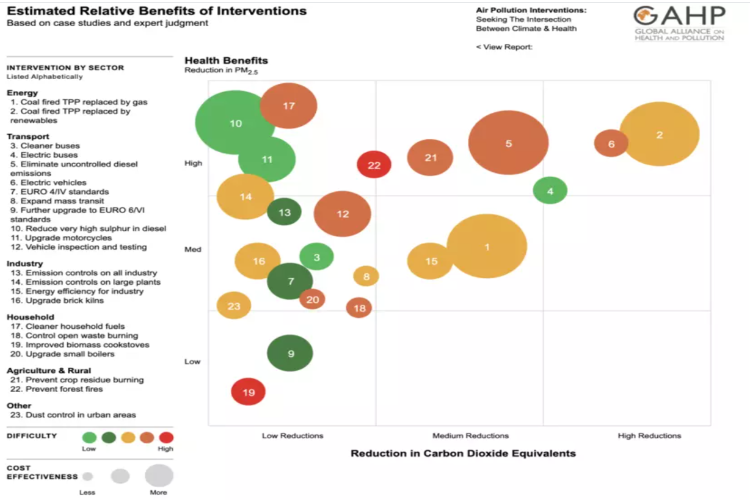
Should there be separate policy measures to address the twin challenges of air pollution and climate change? The traditional wisdom says eliminating one problem will solve the other effectively. But a new study negates this assumption and identifies policy interventions that will tackle both the issues.
Some steps taken to improve air quality like the use of low-sulphur diesel fuel will have no impact on climate change. Some other steps that can reduce global warming will have not have any effect on the health of people. The new study, Air Pollution Interventions: Seeking the Intersection between Climate and Health, decouples the challenges to help policy makers.
READ I India’s coal mining reforms: One step forward, two steps back
The study conducted by AirQualityAsia, The Schiller Institute for Integrated Science and Society at Boston College identifies some practical actions that can cut air pollution and address climate change. In the absence of credible data on the outcomes of policy measures, the researchers drew their conclusions from interactions with people involved in air pollution projects around the world to understand what worked and why. The study identifies some popular interventions that will do very little towards solving either of the problems.
The World Health Organisation estimates that poor air quality kills 4.2 million people every year in low- and middle-income countries. The toll rises by another 2.9-4.3 million a year if the impact of indoor air quality is taken into consideration. The biggest threat to human health from air pollution emanates from particulate matter 2.5 microns and smaller in size (PM2.5), produced when fossil fuels are burned. These particles get into the bloodstream, causing damage to respiratory and cardiovascular systems. Air pollution is a major cause of infectious diseases and has been identified as a factor that increases the severity of the COVID-19 pandemic.
READ I Electric vehicles: India on Mission Catch-up against odds
Climate change is the biggest threat to life on earth. The International Panel on Climate Change says temperature increases between 2.5˚C and 10˚C over the next century could result in melting of glaciers, prolonged droughts, extreme weather events and a steady increase in temperature in cities across the world. Climate change can be tackled by reducing atmospheric concentrations of carbon dioxide and black carbon.
Both PM2.5, black carbon and CO2 are released while using carbon fuels for generating energy, for public and private transport and from open fires caused by crop burning, forest fires as well as uncontrolled waste incineration.
Effective policy interventions
Coal-fired power plants are the biggest contributors towards air pollution and climate change. The most effective action policy makers can take to improve public health and slow climate change is reducing the use of coal and other fossil fuels for electricity generation. This is a step that will reduce the emission of both PM2.5 and CO2.
The study considered 22 policy interventions to identify most practical solutions for helping governments and policy makers. Here are some measures that will improve public health and slow climate change:
READ I Anticipating Chinese retaliation for India’s FDI restrictions
Green public transport: Replace petrol and diesel vehicles with electric vehicles. Chinese province of Shenzhen is expected to witness a 48% fall in CO2 emissions and a significant fall in particulate matter by switching diesel-powered public transport to a fleet of electric buses.
Efficient diesel technology: Bringing down vehicle emission levels from Euro I to Euro IV will result in an 80% fall in pollution. Shifting to Euro V standards will cut emissions by another 80%.
Ending crop burning: Educating farmers and introduction of specific technologies can create a win-win situation. Government initiatives improved air quality in Delhi by reducing crop burning in adjoining states. The steps include awareness and capacity building, introduction of technologies and cash incentives to farmers for purchasing straw management machines.
Sajna Nair is a former banker. Her areas of interest are environment, art and culture.

